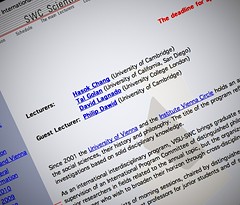Further reflections on the nature of scientific evidence
By Kristopher A. Nelson
in
August 2011
500 words / 3 min.
Tweet
Share
For two weeks this July, I participated in a conference/summer session in Vienna (VISU) on the nature of scientific evidence. The program brought together students and lecturers from a number of disciplines.
Please note that this post is from 2011. Evaluate with care and in light of later events.
 For two weeks this July, I participated in a conference/summer session in Vienna (VISU) on the nature of scientific evidence (see also my initial reflections after the first week). The program brought together students and lecturers from a number of disciplines, including philosophy of science, history of science, cognitive science/psychology, business, literature, and more.
For two weeks this July, I participated in a conference/summer session in Vienna (VISU) on the nature of scientific evidence (see also my initial reflections after the first week). The program brought together students and lecturers from a number of disciplines, including philosophy of science, history of science, cognitive science/psychology, business, literature, and more.
I had several goals for my time in Vienna:
- I wanted to make international connections with colleagues around the world;
- I wished to develop my thinking on the relation of history with evidence–preferably with a bit of legal context;
- since my philosophical background in regards to science needs work, I wanted to find new ways to approach the philosophy of science that would help me to develop my understanding and appreciation of the field.
How well did this summer’s VISU help me to achieve these goals? Quite well!
First, I met many wonderful people from universities around the world. Most, perhaps unsurprisingly, were from Europe or the United States, and they represented a wide variety of disciplinary approaches to science and evidence. For example, I was able to connect with graduate students working on similar questions as I am from a civil law context, providing a useful comparative potential to add to my own work.
Second, I was thrilled that the focus on the legal context was much deeper than I expected. David Lagnado of UCL provided an especially new and intriguing look at the ways in which juries evaluate evidence in the common-law courtroom, and introduced me to the use of Bayesian analysis in evidentiary analysis.
Third, the 10 or so graduate students coming from the discipline of the philosophy of science helped me to appreciate the philosophical debates more fully. I may still not fully embrace what feels to me like a de-contextualized approach to theory, but I can better appreciate the goal and reasons for trying to describe and explain scientific theories.
Some more highlights of the two weeks:
- Bayesian networks as representations of real-world evidential reasoning. Do people really reason this way? Or is this the ideal way we should do probabilistic reasoning? David Lagnado suggests that people may really use this approach–at least as a qualitative matter–but that we don’t do so well when it comes to quantitative weighing of probabilities.
- The distinctions between a civil law approach to scientific experts (generally appointed by the court) vs. the common law one (represent the parties). The civil law approach appears cleaner, but may well bury the issue a bit further underground–and the need to validate the science still exists, it may just not play out in the courtroom.
- Tal Golan asserts that the statistical expert’s growing role as gatekeeper of “true causes” is co-related with the trial judge’s new role as the gatekeeper of “true science.”
All in all, the two weeks was an excellent experience, and I would recommend it to any other graduate students working in related fields.
Related articles
- Initial reflections on the nature of scientific evidence (inpropriapersona.com)
